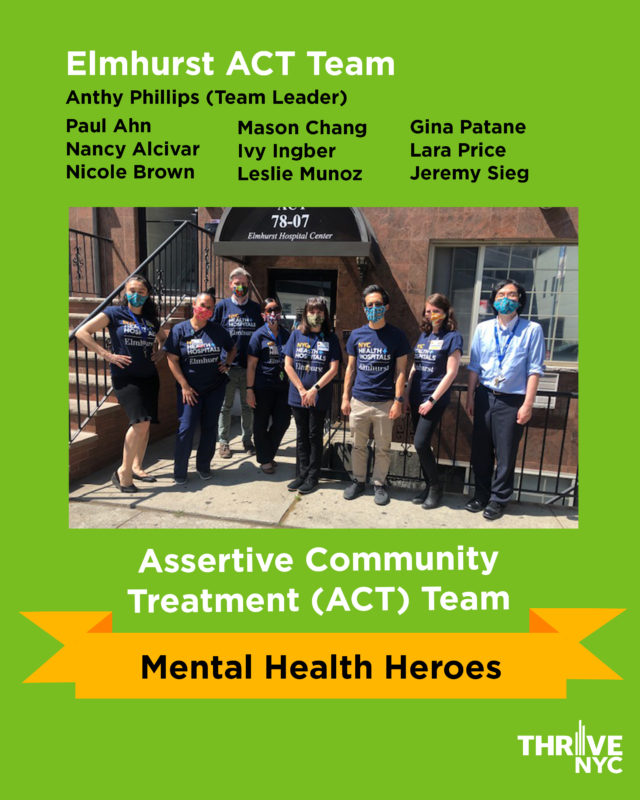Assertive Community Treatment (ACT) Teams: Determined to make contact
 Assertive Community Treatment (ACT) teams go to great lengths to help New Yorkers with serious mental illness stay connected to treatment and remain in their own communities — whether that means meeting them in the park or in a building hallway. They bring mobile mental health treatment and medication to clients and connect them to services like food and housing when needed.
Assertive Community Treatment (ACT) teams go to great lengths to help New Yorkers with serious mental illness stay connected to treatment and remain in their own communities — whether that means meeting them in the park or in a building hallway. They bring mobile mental health treatment and medication to clients and connect them to services like food and housing when needed.
The ACT team based out of Elmhurst Hospital is used to going the extra mile to reach people in need. Because Queens is one of the most diverse places in the world, the team serves patients – and their families – from countries all across the globe. That’s why their small team has such out-sized language capacity, with speakers of English, Spanish, French, Mandarin and Korean. They know how important it is to make people feel comfortable and safe, especially for those worried about their immigration status.
With the transition to telehealth during the COVID-19 pandemic, the Elmhurst ACT Team suddenly faced new challenges. Some patients did not have the necessary technology or were hesitant to use it. Others were suddenly harder to find, and nearby shelters and nursing homes had less capacity to help locate them.
These tough logistical challenges were compounded by the emotional and physical devastation of the moment. The community they serve was one of the hardest hit by COVID – not just in the city, but in the entire country. The ACT Team saw their colleagues at the hospital and patients getting sick, and soon learned that two of their patients tragically passed away. Still, the ACT Team carried on, knowing their work was more important than ever.
They continued to deliver medication in the field, and applied safety precautions so they could accept walk-ins at their hospital office. And despite initial reservations from some patients, they met with patients by phone at least twice a week. When they couldn’t immediately locate a person, they searched until they found him or her. And when the team realized that a typically hard-to-locate patient in Queens needed a phone, they purchased one for him. Now this client has had more sessions with the team than ever before.
“This team was working in ground zero,” said Evelyn Barbosa, Senior Program Specialist, Health Services Manager, at the Department of Health and Mental Hygiene’s Treatment office. “They functioned at a level that was extraordinary for a team located in such a hard hit area. They never complained. They were determined to make contact with clients. They made sure people were not left out in the streets.”
From Anthy Phillips, Team Leader of Elmhurst ACT:
“Our Team is dedicated to providing quality care for individuals who are often overlooked or fall through the cracks of the mental health system. The team’s cohesion helped us through the pandemic and actually brought us closer. We were all in it together.”
Community mental health program: Assertive Community Treatment (ACT) Teams
Managed by the Department of Health and Mental Hygiene, Assertive Community Treatment (ACT) Teams include mental health and substance use professionals and, at times, peer specialists. ACT teams typically meet with clients six times per month in their home or community to provide long-term behavioral health treatment, including medication. ThriveNYC added a master’s level Substance Use Specialist to 40 ACT teams, enhancing these teams’ ability to serve people with co-occurring disorders. Treatment by ACT teams has led to reduced homelessness and fewer psychiatric hospitalizations among the people they serve. During the COVID-19 pandemic, ACT Teams provided a combination of tele-mental health and in-person services in order to successfully continue serving the same number of clients during the height of COVID-19 as they did before the pandemic.